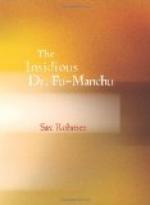CHAPTER I
“A gentleman to see you, Doctor.”
From across the common a clock sounded the half-hour.
“Ten-thirty!” I said. “A late visitor. Show him up, if you please.”
I pushed my writing aside and tilted the lamp-shade, as footsteps sounded on the landing. The next moment I had jumped to my feet, for a tall, lean man, with his square-cut, clean-shaven face sun-baked to the hue of coffee, entered and extended both hands, with a cry:
“Good old Petrie! Didn’t expect me, I’ll swear!”
It was Nayland Smith—whom I had thought to be in Burma!
“Smith,” I said, and gripped his hands hard, “this is a delightful surprise! Whatever—however—”
“Excuse me, Petrie!” he broke in. “Don’t put it down to the sun!” And he put out the lamp, plunging the room into darkness.
I was too surprised to speak.
“No doubt you will think me mad,” he continued, and, dimly, I could see him at the window, peering out into the road, “but before you are many hours older you will know that I have good reason to be cautious. Ah, nothing suspicious! Perhaps I am first this time.” And, stepping back to the writing-table he relighted the lamp.
“Mysterious enough for you?” he laughed, and glanced at my unfinished Ms. “A story, eh? From which I gather that the district is beastly healthy— what, Petrie? Well, I can put some material in your way that, if sheer uncanny mystery is a marketable commodity, ought to make you independent of influenza and broken legs and shattered nerves and all the rest.”
I surveyed him doubtfully, but there was nothing in his appearance to justify me in supposing him to suffer from delusions. His eyes were too bright, certainly, and a hardness now had crept over his face. I got out the whisky and siphon, saying:
“You have taken your leave early?”
“I am not on leave,” he replied, and slowly
filled his pipe.
“I am on duty.”
“On duty!” I exclaimed. “What, are you moved to London or something?”
“I have got a roving commission, Petrie, and it doesn’t rest with me where I am to-day nor where I shall be to-morrow.”
There was something ominous in the words, and, putting down my glass, its contents untasted, I faced round and looked him squarely in the eyes. “Out with it!” I said. “What is it all about?”
Smith suddenly stood up and stripped off his coat. Rolling back his left shirt-sleeve he revealed a wicked-looking wound in the fleshy part of the forearm. It was quite healed, but curiously striated for an inch or so around.
“Ever seen one like it?” he asked.
“Not exactly,” I confessed. “It appears to have been deeply cauterized.”
“Right! Very deeply!” he rapped. “A barb steeped in the venom of a hamadryad went in there!”




